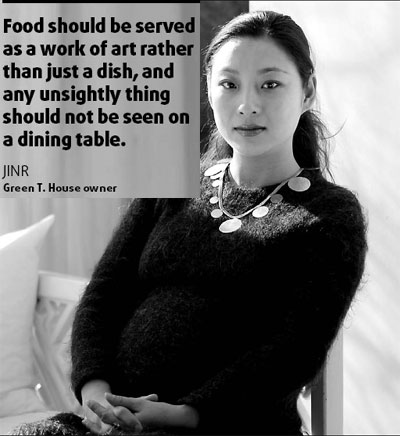At GTH, food is served as a work of
art.
Musician JinR (Zhang Jinjie) opened her first teahouse in
Beijing in 1997. Tucked away in Sanlitun, the city's diplomatic
quarters and popular night life center, the 12-sq-m room was big
enough for just three tables and her favorite instruments - the
yangqin (dulcimer) and guzheng (seven-stringed plucked instrument
similar to the zither).
For days, she waited for a customer to come, wondering if the
whole idea was a mistake.
Eventually, a Japanese woman showed up and ordered a pot of tea.
JinR was so excited to see her that she played a classical song on
the yangqin to welcome her.
But the Beijinger's passionate performance was so loud she ran
out.
Though JinR's first customer was scared away, her bad luck also
fled and business has blossomed since then.
Now, Green T. House (GTH) has become one of the hottest
destinations in the capital, featuring innovative design and
distinctive cuisine.
"I am an artist of life," the 35-year-old says.
"I am stubborn, but I don't think it is my weakness because any
defects can be converted into advantages, depending on how you work
on it.
"It has driven me to try my hardest to reach for excellence even
with tiny things. It might be torture for some people, but this is
happiness for me."
Opened in 2002, GTH is big enough to house at least two
basketball courts. Designed by JinR, the furniture is in either
black or white, and is all tall, Wooden chairs have more than 2-m
high backs, and there is a huge cage and big Chinese-style
screens.
JinR regards it as home, thus every customer should ring the
bell first to enter.
Wearing delicate make-up and an elegant dress, JinR looks
trendier than most heavily pregnant woman.
She makes few references to her success, instead she shares
stories from her past.
At her parents' wish, JinR started to learn yangqin at the age
of 6.
Playing traditional Chinese songs, she discovered, was not all
that interesting. She felt depressed about never being allowed to
play her own pieces.
Sometimes she worked up the courage to play one, but her teacher
would criticize her and tell her to play classical music.
In 1990, she enrolled at the Central Conservatory of Music,
majoring in the instrument. Two years later, she dropped out and
left for Guangdong province to follow her dream of becoming a
famous pop singer.
But the dream soured.
She found the record company was trying to turn her into
something she didn't want to be.
"I am like a dog, running fast. But if you raise a dog like a
cat imagine how uncomfortable it would be," she says.
After returning to Beijing, JinR began playing at various
restaurants and teahouses to make a living. After doing this for
three years, a friend asked her if she would be interested in
running a shop in Sanlitun.
Drawn to the idea of a traditional Chinese teahouse, she
accepted the challenge.
Life was tough at the beginning.
She loved to have customers but was too poor to hire a cleaner
and had to do all the washing-up, with her delicate musician's
hands.
"It feels like I did a lifetime of washing-up during that
period," she says.
JinR then decided to take advantage of the demand for food at
her teahouse, but didn't know how to cook.
"I am inspired by being under pressure. I always practiced
yangqin many times before a performance. I had stage fright, but
there is no point hiding, you just move forward."
She spent nights wondering around the city's bars, taking note
of those dishes. When she dined out, JinR wrote down every
ingredient she could identify from the dish she ate.
JinR has now developed her own concept of cooking.
"Food should be served as a work of art rather than just a dish,
and any unsightly thing should not be seen on a dining table," she
says.
The interior of Green T. House Living features innovative
design. Photos courtesy of JinR
For instance, a bowl of common noodles, can be served with green
tea soup and some colorful extras on the top - slices of red
carrots, green cucumber or eggs to make it look nice.
She believes Chinese traditional food needs innovation and
improvement, especially in how it is presented. But she denies
artists are the only people who can recognize beauty.
"Every one has two eyes - the physical and the spiritual. The
physical eye is to see the appearance of an object, while the
spiritual one is to explore the beauty and layers under the
substance," she says.
In order to find inspiration, JinR's chefs are required to visit
local galleries or attend art exhibitions.
In 2002/03, JinR participated at the World Gourmet Summit in
Singapore, the first Chinese female to do so. Despite this
achievement, you'll never hear her brag about it.
"Many of my friends are expanding their businesses across the
country, while I am still struggling putting two pieces of dessert
in a better position," she says. "It might sound ridiculous, but I
am convinced what has kept me going is that I love what I do, and I
enjoy beautiful things."
Two years ago, JinR launched Green T. House Living in Beijing to
promote tea culture and fine dining. She opened another GTH in Hong
Kong last year.
The trendsetter claims the most precious things in life are free
of charge - sunshine and fresh air for instance - and some of her
deftest creations cost little more than that.
One day, she picked up some branches on the street and brought
them back to the restaurant. After painting them black, they looked
good enough to be placed on tables.
JinR married an Australian man in 2006. Their first baby is due
next month. But the mother-to-be doesn't plan on a big break after
her delivery.
"Not working is a real torture for me," she says.
(China Daily January 24, 2008)




